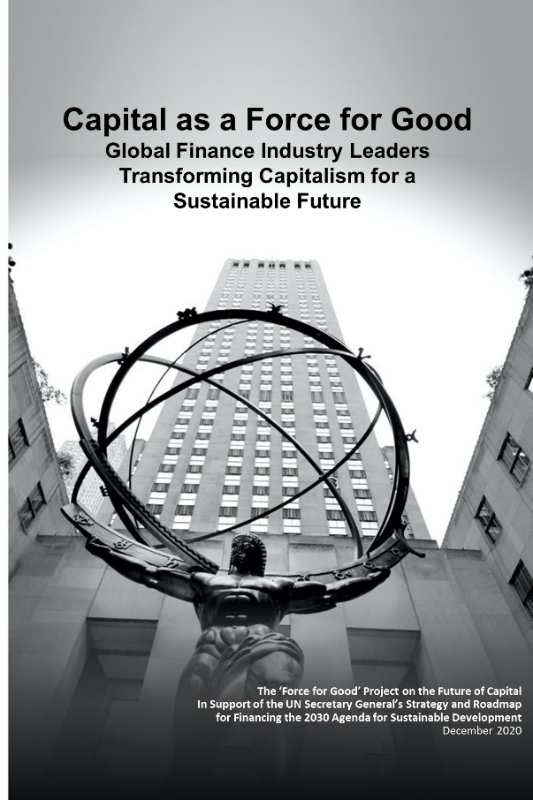Date: December 18, 2020
Capital Set to be a Force for Good in the World
The Global Finance Industry is Transforming Capitalism for a Sustainable Future
There is a substantial and growing ‘common ground’ in the finance industry’s focus on sustainability and broader stakeholder engagement which has the potential to transform capitalism for a sustainable future, as evidenced by the initiatives being undertaken by more than 60 industry leaders.
On December 15th the results of a new report, “Capital as a Force for Good: Global Finance Industry Leaders Transforming Capitalism for a Sustainable Future”, were launched at the ‘Global Leadership in the 21st Century’ conference organized by the United Nations, Geneva and the World Academy of Art and Science, in support of the UN Secretary General’s 2030 Agenda for Sustainable Development.
63 leading institutions in the global finance industry, representing over US$100 trillion, and nearly 30% of the world’s financial assets, are pointing the way for the industry as a whole to respond to major global challenges including climate change, financial inclusion and inequality.
The new report documents and analyzes their activity in terms of environmental, social and governance (ESG) polices, sustainability programs, and stakeholder engagement, whose cumulative impact determines how they can be a “force for good” in the world. Taken together, these activities can have a significant impact on driving sustainability in the world, both directly and indirectly through changes in the way capital is deployed, driving up the cost for those that damage it.
Commenting on the report, Chantal Line Carpentier, Chief, UNCTAD New York office of the Secretary-General, and Will Kennedy, UN Senior Programme Officer, UN Office for Partnerships said, “Capital has an essential role to play in the realization of a more resilient, inclusive, sustainable, and prosperous world for current and future generations as defined by the SDGs. We welcome this report and how it documents the actions of financial institutions towards accelerating the impact of their industry to become a ‘force for good’ that it evidences.”
The activities of finance industry leaders are establishing a significant common ground in terms of sustainability and stakeholder engagement:
- US$12.5 trillion of assets being actively managed for sustainability criteria, with organizations building ESG factors into their investment decisions
- 100% have adopted sustainable investing targets
- 98% apply a series of ESG screening metrics to proactively promote the funding of what they see as sustainable projects and enterprises
- 97% have committed to actively reducing their own carbon footprint
- 90% have stated their commitment to the broader stakeholder community
- 84% have prioritized climate action as an urgent priority
- 73% offer or invest in sustainable products, such as green bonds or sustainable loans
30 leading financial institutions contributed actively to the report: Bank of America, BlackRock, Bridgewater Associates, CDPQ, Citi, Credit Suisse, Fidelity Investments, First Abu Dhabi Bank, GIC Singapore, Goldman Sachs, Great-West Lifeco, HDFC Ltd, HSBC, Investec Bank, Japan Post Holdings, JPMorgan Chase, Liberty Mutual Insurance Group, Lloyds Banking Group, Morgan Stanley, Ninety One, Nomura, Nordea, Northern Trust, OMERS, Putnam Investments, Schroders, SEB, State Street, UBS, and Wellington.
These 30 companies have disclosed a series of ambitious sustainable development initiatives including zero carbon financing portfolios, financial inclusion for the world’s poorest, and launching international development finance institutions, among others. Together, these initiatives point to a fundamental change in strategy and priorities for the industry’s leaders.
Garry Jacobs, Chief Executive of The World Academy of Art and Science commented: “This report points to a major ongoing shift by the finance industry as partners in the quest for a sustainable future for all humanity.”
The emerging common ground among leading financial institutions across the world sets a high bar for others in the industry. These institutions are setting the standard for the finance industry’s engagement on critical issues, promoting ESG factors as a guiding criteria for what they choose to finance, and addressing broader stakeholders. This is increasingly defining what it means to be a ‘force for good’ in the world. The scope of actions being taken makes such institutions leaders in society as a whole, beyond finance, assuming a broader role in the global community.
Ketan Patel, lead author and Chair of the project steering group for the report commented: “These leading financial institutions are shifting the industry’s business model to one that consciously makes an impact while meeting their fiduciary duties. Their success sets an ever-rising bar for the industry … creating a widening gap with those that choose a narrow definition of their purpose.”
The report also provides further evidence of the link between sustainability and investment performance. Those financial institutions found to be doing more across the categories of initiatives analyzed as a ‘force for good’, delivered an up to 86% shareholder premium over the industry benchmark over the long term. Their performance indicates that the shift in the finance industry currently underway is likely to be self-sustaining.
About This Report: The core data used to compile the report has been sourced using publicly available information from 63 leading financial institutions across regions, split across banks, asset managers (including government pension funds, sovereign wealth funds, and hedge funds) and insurance companies. 30 institutions have participated actively in the project, providing additional information about their initiatives and business activities, enabling a deeper understanding of the ideas, trends and potential changes that are emerging and may shape the future of finance and capitalism. Active participation does not imply an endorsement of the report by the respective companies and organizations.
The study for this report was mandated as a result of the United Nations, New York, examining the ‘future of capitalism’, hosted by UNCTAD and the UN Office for Partnerships.